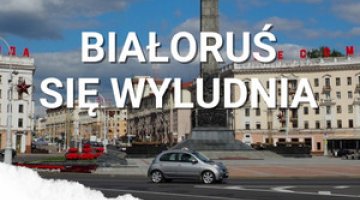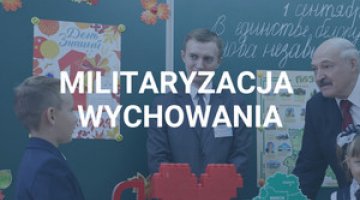Lukashenka’s anti-Polish speech on the occasion of National Unity Day
Alyaksandr Lukashenka gave a keynote speech on Belarusian historical policy during the patriotic “This is our history!” forum which was held in Minsk on 17 September on the occasion of the National Unity Day celebrations. This public holiday was established in 2021 to commemorate the anniversary of the Soviet invasion of Poland on 17 September 1939. Lukashenka stated that it is as important for the historical memory of Belarusians as its Independence Day celebrated on 3 July (the liberation of Minsk by the Red Army in 1944) and the anniversary of the October Revolution, which is still commemorated. He also stressed that the reuniting of eastern and western Belarus has laid the foundation for a Belarusian statehood that is resistant to many challenges, including the ongoing “Western pressure”.
Lukashenka clearly pointed out that, throughout history, the Belarusian lands have developed only “in alliance with their East Slavic neighbours”, while Western influence, primarily Polish, has only led to the loss of national potential in every dimension. He claimed that both within the Polish-Lithuanian Commonwealth and in the Second Polish Republic (whose government in the 1930s allegedly “licked the shoes of the Third Reich”) there was a “destruction” of the Belarusian nation, and the Polish elites still perceive western Belarus as their “eastern borderlands” and strive to regain them. At the same time, he drew attention to the “ingratitude” of Poles towards the Red Army which during World War II “sacrificed the lives of 600,000 of its own soldiers – including Belarusians – to liberate Poland from fascism”. In his opinion, Warsaw not only underestimates the Belarusian contribution to the victory over the German occupier, but also shows disrespect to the sovereign Belarus through “false” propaganda seen on Belsat television, by maintaining numerous opposition organisations in its territory (he mentioned, amongst other organisations, the association of former officers of law enforcement agencies ByPol), by issuing the Pole’s Cards and training paramilitary units in Poland whose task is to “restore the pre-1939 borders”.
Commentary
- National Unity Day has a clearly anti-Polish undertone. This originates from deep-seated anti-Polish phobias held by Lukashenka and a significant part of the present Belarusian power elite. It is also Minsk’s response to Warsaw’s active role in the imposition of further EU sanctions after the rigged presidential election in 2020, as well as to Poland’s extensive support for Belarusian emigrants and civil society. Furthermore, this event is an attempt at the ideological mobilisation of the regime’s supporters to counter the allegedly growing threat of “Polish revisionism” which, as Lukashenka claims, is based on historical sentiments linked with the “eastern borderlands”. It is also worth noting that history is playing an ever greater role in the government’s propaganda. Proof of this was seen in Lukashenka’s decision to declare 2022 the “year of historical memory”. His engagement in celebrations this year shows that the regime is consistent in its efforts to build a negative image of Poland among the Belarusian public.
- Minsk’s rhetoric, which could be heard both during the celebrations of National Unity Day and on the occasion of other historical anniversaries (including on 1 September during Lukashenka’s widely publicised lecture for school students), has become radicalised over the past several months. This radicalisation has been intensifying particularly since Russia’s invasion of Ukraine. It is also increasingly resembles the Russian historical narrative, as demonstrated not only by the use of the simple dichotomy between the “bad West” and “good Russia”, but also by the claim that Poles have a moral “debt” towards the “liberating” Red Army which was clearly present in Lukashenka’s speech on 17 September. The clearly growing similarity between the Belarusian and the Russian policy of remembrance is another manifestation of Belarus’s subordination to Moscow.
- Minsk’s radically anti-Polish narrative has been accompanied by hostile actions suggesting that a comprehensive strategy is being implemented against Warsaw in order to eliminate Polishness from all manifestations of public life. Since April 2021, the Belarusian prosecution authorities have been investigating the genocide of the Belarusian people in 1941–1951. In this investigation, a lot of attention is devoted to the alleged “crimes” committed by Polish guerrillas during and after World War II. The investigators’ work (in cooperation with their Russian counterparts) resulted in a paper titled On the Genocide of the Belarusian Nation – materials and analytical-information documents, published in April and actively popularised by the government. The paper documents, amongst other things, individual crimes committed by members of the Polish underground. Furthermore, since June this year, Polish military cemeteries and memorial sites, located mainly in the Hrodna region, have been damaged or even completely liquidated (so far there have been at least 12 acts of vandalism). In addition to this, on the basis of the provisions of the amended Education Act, the Belarusian education authorities decided that Polish will no longer be the language of instruction at the two Polish secondary schools operating in Hrodna and Vawkavysk, beginning from the 2022/2023 school year. On top of that, the curriculum of history classes in all schools in Belarus was extended to include the issue of the “denationalisation and economic exploitation” of the Belarusian minority in the Second Polish Republic and (based on materials from the General Prosecutor’s Office) crimes against the Belarusian population after 1941, including those committed by “Polish nationalists”. There are also announcements of control being tightened on Belarusian citizens holding the Pole’s Card. One of the consequences of this will be to block the possibility of employing them in the state administration.




